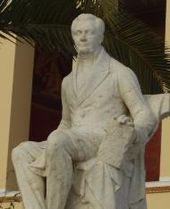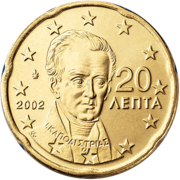Ioannis Kapodistrias

Ioannis Antonios Kapodistrias Graf ( Greek Ιωάννης Καποδίστριας , born January 31 . Jul / 11. February 1776 greg. On Corfu , † September 27 . Jul / 9. October 1831 . Greg in Nafplion ) was the first head of state of Greece after its independence from Ottoman Empire .
Youth and first Greek career
Ioannis Antonios Graf Kapodistrias (named after the town of Capo d'Istria , from which his family probably immigrated to Corfu in the 14th century ) studied philosophy and medicine in Padua and Venice . After returning to his homeland, where the Illyrian provinces had come under French sovereignty in 1797 , he embarked on a diplomatic career.
When the Ionian Islands were placed under Ottoman sovereignty as a republic on March 20, 1800 , he was commissioned to organize the administration of the islands of Kefalonia , Santa Maura and Ithaca , then became Senate Secretary, and worked with Theotokis and Mocenigo on the new constitution and in 1803 took over the Ministry of the Interior, then that of the Foreign.
During the rebellion of Ali Pasha of Ioannina against the Sublime Porte in 1807, Kapodistrias was appointed commander in chief of all the militias of the Ionian Islands and led a successful struggle until the peace of Tilsit in 1807, through which the Ionian Islands fell back to France, caused him to stand up to withdraw his goods.
Russian career
In 1809 he was appointed to the Russian Foreign Ministry in Saint Petersburg . In 1811 he was transferred to the Russian embassy in Vienna and in 1812 to the headquarters of the Russian Danube Army . In 1813 he accompanied Emperor Alexander as head of the firm in the war against Napoleon , won the trust and was commissioned in the wake of important diplomatic missions: in November 1813 as an envoy in Switzerland , where he their accession to the alliance against Napoleon I reached and at the Congress of Vienna , where he was the Russian Plenipotentiary. He also brought about the restoration of the Ionian island republic under Great Britain's exclusive protection. He signed the Second Paris Peace on November 20, 1815 for Russia. Initiated by the Russian Tsar, he conducted persistent negotiations in close cooperation with Charles Pictet de Rochemont from Geneva , which resulted in Switzerland being granted permanent neutrality by decree. In 1816 he was appointed State Secretary and, together with Count Karl Robert von Nesselrode, administered the foreign affairs of Russia as well as the new province of Bessarabia .
Second Greek career
From 1814 Ioannis Kapodistrias President of Hetaeria of Philo Muses , but declined in 1819 to make the request at the head of which decreases. The guerrilla war that Alexander Ypsilantis sought to unleash for the liberation of Greece from Ottoman rule was not approved by Kapodistrias. In doing so, he conformed to official Russian policy. In 1822 he resigned from the Russian civil service and went to Lausanne and Geneva , in 1826 to France, the Netherlands and Germany, where he campaigned for the independence of Greece.

In April 1827 he was elected by the Greek National Assembly in Trizina for seven years as the first President (Cybernetes) of Greece. Since he was considered an outsider, the divided clans and parties regarded him as harmless to their interests. His attempts to rule the devastated land quickly brought him into conflict with traditional forces. His regulatory measures and a very rapid reorganization of the country overwhelmed many Greeks. The independence of Greece was mainly guaranteed by Great Britain. The interests of Great Britain, however, were partially opposed to its pro-Russia policy. Increasingly, he acquired the reputation of a "Russian prefect". He was severely attacked by the English party. Ioannis Kapodistrias opposed this resistance with an increasingly taut autocratic regiment completely unknown to the Greeks. He was also accused of favoring his compatriots from the western islands and of practicing nepotism. He was also suspected of having deliberately brought about the rejection of the Greek crown by Prince Leopold von Coburg in order to be able to become king himself. Riots broke out on Hydra and in the Mani . When he had the prince of Mani, Petros Mavromichalis , arrested, he was arrested by the brother of the arrested, Konstantinos, and by the son of the arrested, Georgios, on September 27th July. / October 9, 1831 greg. murdered in Nafplion on the way to the Church of St. Spyridon .
Since 1830 he was an honorary member of the Bavarian Academy of Sciences .
Aftermath
Political aftermath
He was briefly succeeded by his brother Augustinos Kapodistrias . The power struggles triggered by his assassination soon led to the signatory powers of the independence of Greece, Great Britain, France and Russia, intervening and, with the London Protocol of May 7, 1832, appointing the Bavarian Prince Otto as King of Greece .
memory
- The National and Kapodistrian University of Athens was named after him.
- A monument was erected to him in Corfu in 1887.
- The airport of Corfu was named after him.
- Kapodistrias' portrait can now be found on the Greek 20 cent coin.
- In almost every Greek town a street is named after him, including in his long-term residence Aegina , the capital of the island of the same name.
Quotes
Lulu Countess Thürheim , who met him in Karlsbad in the summer of 1817 , described Kapodistrias as follows:
“This is a humble man, but his character and understanding give him control over all with whom he associates; his penetrating and melancholy gaze inherently reveals the soul of a philosopher who has thought about everything and recognized that nothing in this world is of great value. His Greek accent (he is Korfe) gives his pronunciation something strange and graceful, which agrees with the calmness of his movements, his original eloquence and the harmony in his whole being and makes him appear in my eyes very different from the other people of spirit I've met so far. Nothing in him betrays the favorite. Capo d'Istria would be completely adorable if he were ten years older, because with his barely forty years and his lovely smile and eyes that I have never seen so beautiful, he could be a little less serious and more young. "
Report by Charles Pictet de Rochemont to the Geneva Grand Council at the end of the mission (April 1815):
«[…] Of all those who were interested in our successes, none of them expressed their interest so persistently, so benevolently, so intelligently and so effectively as Count Capo d'Istria. In the ninety-two meetings that I had with him, he was always himself, the best teacher, the best advisor, with a patience that nothing could shake, although the business of the confederates would often have given him justified cause for annoyance and the great negotiations with Poland and Saxony were mainly left to him, which would have excused his indifference to the interests of little Geneva "
In 1839, eight years after Kapodistria's death, his Geneva secretary and later mayor of Geneva, Elie-Ami Bétant, wrote in a biography dedicated to his memory:
«Born in a weak, divided republic […], familiar with the passionate language of the people, Capodistrias found himself at home very well in the midst of the conflicts that shook the Swiss Confederation at that time. He achieved their esteem because he never played a double game with them, was never implacable and because he familiarized himself with the affairs of the Confederates [...] »
«Capodistrias' behavior in Switzerland has always done him the greatest honor. At first the mission earned him the hostility of the various parties whose interests he violated; but little by little his noble qualities were increasingly valued, and today the Swiss unanimously regret his passing; his name is equally venerated by men of the most diverse opinions »
Autobiography and correspondence
- Αυτοβιογραφία Ιωάννου Καποδίστρια. Επιμέλεια Μιχαήλ Λάσκαρι. Μετάφραση Μιχαήλ Λάσκαρι. Ερμείας u. a., Athens 2000, ISBN 960-216-127-2 (In French: Jean Capodistria: Aperçu de ma carrière publique depuis 1798 jusqu'à 1822 (= Du Directoire à l'Empire. Volume 15). La Vouivre, Paris 1999, ISBN 2-912431-08-5 ).
- Ελένη Ε. Κούκκου, Ευδοκία Παυλώφ-Βαλμά (Ed.): Ιωάννης Α. Καποδίστριας. Ανέκδοτη αλληλογραφία με τους Philippe-Emmanuel de Fellenberg, Rudolf-Abraham de Schiferli. 1814-1827. Ολκός, Athens 1999, ISBN 960-7169-95-6 (edition of Kapodistrias' correspondence with Philipp Emanuel von Fellenberg and Rudolf Abraham von Schiferli ).
source
- Polychronis Enepekides : Ρήγας - Υψηλάντης - Καποδίστριας. Έρευναι εις τα αρχεία της Αυστρίας, Γερμανίας, Ιταλίας, Γαλλίας και Ελλάδος. = Rhigas - Ypsilanti - Capodistria. Archive research in Austria, Germany, Italy, France and Greece (= Πηγαί και έρευναι περί της ιστορίας του Ελληνισμού από του 1453. = Sources and researches on the history of Greece since 1453. Volume 1). Βιβλιοπωλείον της Εστίας, Athens 1965.
literature
- Fabrizio Frigerio: Capodistrias, Jean-Antoine . In: Swiss Lexicon . Mengis & Ziehr Ed., Lucerna 1991-1993, Volume 1, pp. 817-818.
- Karl Mendelssohn Bartholdy : History of Greece from the conquest of Constantinople by the Turks in 1453 to our day. Volume 2: From the takeover of administration by Kapodistrias to the age of King Otto (= state history of the latest time. Volume 20, 2). Hirzel, Leipzig 1874.
- William P. Kaldis: John Capodistrias and the modern Greek state. University of Wisconsin - The State Historical Society of Wisconsin for the Department of History, University of Wisconsin, Madison WI 1963 (Wisconsin, University, dissertation).
- Christopher M. Woodhouse : Capodistria. The founder of Greek independence. Oxford University Press, London a. a. 1973, ISBN 0-19-211196-5 .
- Christopher M. Woodhouse: Kapodistrias and the Philiki Etairia, 1814-1821. In: Richard Clogg (Ed.): The Struggle for Greek independence. Essays to mark the 150th anniversary of the Greek War of Independence. Macmillan, London et al. a. 1973, ISBN 0-333-14701-4 , pp. 104-134, digitized version (PDF; 1.7 MB).
Web links
- Ioannis Kapodistrias Biography (Greek)
- Jean-Claude Favez: Ioannis Kapodistrias. In: Historical Lexicon of Switzerland .
Individual evidence
- ^ Geneviève Lüscher: Ioannis Kapodistrias: Obstetrician of neutral Switzerland . In: NZZ am Sonntag . May 19, 2015, p. 55 ( admin.ch [PDF; 221 kB ; accessed on March 8, 2019]).
- ^ Karl Mendelssohn Bartholdy: From the takeover of the administration by Kapodistrias to the age of King Otto . Leipzig 1874.
- ↑ member entry by Johannes Anton Graf Capo d'Istrias at the Bavarian Academy of Sciences , accessed on 12 January 2017th
- ↑ Lulu Countess Thürheim : My life. Memories from Austria's big world. 1788–1852 (= memorabilia from old Austria. 8). Volume 2: 1788-1819. Edited by René van Rhyn. Müller, Munich 1923, p. 233 f.
- ↑ Lucien Cramer: Correspondance diplomatique de Pictet de Rochemont et de François d'Ivernois. Paris, Vienna, Turin 1814–1816. 2 vols., Geneva-Paris 1914, I, XXIII (quoted from: Federal Department of Foreign Affairs: Ioannis Kapodistrias ).
- ^ A b Elie-Ami Betant: Correspondant du Comte J. Capodistrias, Président de la Grèce. Volume I, Geneva-Paris 1839, pp. 25 and 28 (quoted from: Federal Department of Foreign Affairs: Ioannis Kapodistrias ).
| predecessor | Office | successor |
|---|---|---|
| Alexandros Mavrokordatos |
Head of State of Greece 1828–1831 |
Augustinos Kapodistrias |
| personal data | |
|---|---|
| SURNAME | Kapodistrias, Ioannis |
| ALTERNATIVE NAMES | Kapodistrias, Ioannis Antonios Graf (full name); Καποδίστριας, Ιωάννης (Greek) |
| BRIEF DESCRIPTION | Greek politician and first head of state of Greece |
| DATE OF BIRTH | February 11, 1776 |
| PLACE OF BIRTH | Corfu |
| DATE OF DEATH | October 9, 1831 |
| Place of death | Nafplion |



